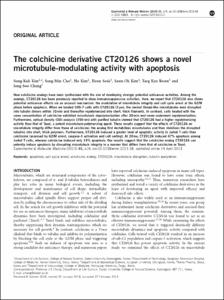The colchicine derivative CT20126 shows a novel microtubule-modulating activity with apoptosis
- Affiliated Author(s)
- 권택규
- Alternative Author(s)
- Kwon, Taeg Kyu
- Journal Title
- Experimental and Molecular Medicine.
- ISSN
- 1226-3613
- Issued Date
- 2013
- Abstract
- New colchicine analogs have been synthesized with the aim of developing stronger potential anticancer activities. Among the
analogs, CT20126 has been previously reported to show immunosuppressive activities. Here, we report that CT20126 also shows
potential anticancer effects via an unusual mechanism: the modulation of microtubule integrity and cell cycle arrest at the G2/M
phase before apoptosis. When we treated COS-7 cells with CT20126 (5 lM), the normal thread-like microtubules were disrupted
into tubulin dimers within 10min and thereafter repolymerized into short, thick filaments. In contrast, cells treated with the
same concentration of colchicine exhibited microtubule depolymerization after 20min and never underwent repolymerization.
Furthermore, optical density (OD) analysis (350nm) with purified tubulin showed that CT20126 had a higher repolymerizing
activity than that of Taxol, a potent microtubule-polymerizing agent. These results suggest that the effects of CT20126 on
microtubule integrity differ from those of colchicine: the analog first destabilizes microtubules and then stabilizes the disrupted
tubulins into short, thick polymers. Furthermore, CT20126 induced a greater level of apoptotic activity in Jurkat T cells than
colchicine (assessed by G2/M arrest, caspase-3 activation and cell sorting). At 20nM, CT20126 induced 47% apoptosis among
Jurkat T cells, whereas colchicine induced only 33% apoptosis. Our results suggest that the colchicine analog CT20126 can
potently induce apoptosis by disrupting microtubule integrity in a manner that differs from that of colchicine or Taxol.
Experimental & Molecular Medicine (2013) 45, e19; doi:10.1038/emm.2013.38; published online 19 April 2013
Keywords: apoptosis; cell cycle arrest; colchicine analog; CT20126; microtubule disruption; tubulin acetylation
INTRODUCTION
Microtubules, which are structural components of the cytoskeleton,
are composed of a- and b-tubulin heterodimers and
play key roles in many biological events, including the
development and maintenance of cell shape, intracellular
transport, cell division and cell growth.1,2 A subset of
microtubules called spindle fibers support proper cell division
by pulling the chromosomes to either side of the dividing
cell. In
- Department
- Dept. of Immunology (면역학)
- Publisher
- School of Medicine
- Citation
- Sung-Kuk Kim et al. (2013). The colchicine derivative CT20126 shows a novel
microtubule-modulating activity with apoptosis. Experimental and Molecular Medicine., 45(e19), 1–7. doi: 10.1038/emm.2013.38
- Type
- Article
- ISSN
- 1226-3613
- Appears in Collections:
- 1. School of Medicine (의과대학) > Dept. of Immunology (면역학)
- 파일 목록
-
-
Download
 oak-aaa-01829.pdf
기타 데이터 / 1.18 MB / Adobe PDF
oak-aaa-01829.pdf
기타 데이터 / 1.18 MB / Adobe PDF
-
Items in Repository are protected by copyright, with all rights reserved, unless otherwise indicated.